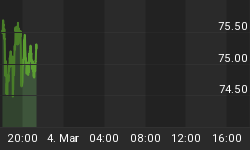Gold Slips as Deflation Bites, But "Unlikely to Persist" as Central Banks Stay Too Loose, Too Long
THE PRICE OF GOLD eased back from a 3-session high of $945 an ounce early in London on Tuesday, dropping back as European stock markets dipped and government bond prices ticked lower worldwide.
Only short-dated German Bunds rose, buoyed by bad economic news and pushing 1-year yields down to 0.81% ahead of Thursday's interest-rate decision from the European Central Bank (ECB).
Crude oil also slipped back, down from Monday's new 8-month highs above $73 per barrel.
"The recovery in commodity prices during the first half of this year has caught much of the market by surprise," writes Leon Westgate in today's Commodities Daily from Standard Bank.
Since New Year's Day, Westgate notes, copper and lead gained 58% and 57% respectively, while US crude oil contracts added 53%.
"We continue to see small-scale physical gold buying whenever gold dips towards $935," adds his colleague at Standard Bank Walter de Wet.
"This is providing good support [but] quarter-end window-dressing and a lack of momentum combine into our preferred [short-term] strategy to sell into gold rallies."
"[Summer] languor appears to have set into the gold market," agrees John Reade at UBS, also in London. But Canada's National Post today notes that gold "has a period of seasonal strength from July 12 to Oct. 9," according to Brooke Thackray's 2009 Investor's Guide: How to Profit from Seasonal Market Trends.
"The trade has been profitable in 18 of the past 24 periods."
For UK investors, the Gold Price has dipped in twenty out of the last 39 summers before rising in autumn and winter to end the year higher.
Thirteen of these "summer sales" came during long-term bull runs, such as gold buyers enjoyed during the 1970s' inflation and again this decade.
"The probability of a real Sterling crisis is [now] around one in three, and the probability of major tax hikes and cuts in public spending is roughly one in one," says Harvard professor and British finance historian Niall Ferguson in an interview with Bloomberg.
"Our public finances are easily the worst we've ever had in peacetime," adds Margaret Thatcher's former finance minister Nigel Lawson.
"The amount of borrowing the government will have to do as a result of the deficit is very worrying."
New data today showed the British economy shrinking at its fastest pace on record, down 4.9% year-on-year to the end of March.
Business investment shrank by almost one-tenth. The UK's trade deficit held at £34 billion annualized ($56bn) despite a drop in the Pound's trade-weighted value worse than both the IMF bail-out of 1976 and the abandonment of gold in 1931.
Sterling retreated 1.5¢ on the news, down from a new 8-month high of $1.6740 to push the Gold Price in British Pounds 1% higher from a 4-session low at £562.
New German data meantime showed unemployment rising for the seventh month running to 8.3%, while across the 16-nation Eurozone, consumer prices fell year-on-year for the first time since current records began 12 years ago.
"With a more timid policy response than elsewhere," said Daniele Antonucci at Capital Economics to Dow Jones, "the risk is that the Eurozone might ultimately enter a more prolonged and damaging period of deflation."
Last week saw the European Central Bank (ECB) lend €442 billion ($620bn) to Eurozone banks at just 1% interest. But growth in the Eurozone money supply still fell in May, the official statistics agency said this morning.
Dropping to a 12-year low of 3.7% annually, growth in the broad M3 measure was just half its average of the last three decades. It fell below the ECB's initial target of 4.5% per year - set when the Euro became legal tender in 2000 - for the first time since 2001.
Eurozone investors now Ready to Buy Gold saw the price unmoved at €666 an ounce by lunchtime Tuesday in Frankfurt, more than 140% above its level when the single currency was introduced.
Today's M3 data showed annual growth in new lending to Eurozone governments rising to 8.3%, up from 8.0% in April.
"History suggests that deflation is highly unlikely to persist in the long run," says the Intelligent Investor column at the Wall Street Journal, noting that the Great Depression only saw prices fall from 1930 to 1932.
"With Uncle Sam now on a borrowing binge," it adds, "we could easily end up with too much money chasing too few goods - the very definition of inflation."
The WSJ's Intelligent Investor recommends buying inflation-linked Treasury bonds (TIPS) for protection. It does not mention gold.
"[Policy-makers] have a tendency to be late, tightening financial conditions slowly for fear of doing it prematurely or too severely," says the Bank for International Settlements in its latest annual report, warning that acting too slowly may spark severe inflation.
"Because their current expansionary actions were prompted by a nearly catastrophic crisis, central bankers' fears of reversing too quickly are likely to be particularly intense, increasing the risk that they will tighten too late."















